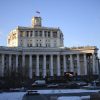 The Resolution Foundation believes Hunt has around £13 billion in reserve, double what he had in the spring
The Resolution Foundation believes Hunt has around £13 billion in reserve, double what he had in the spring
Falling inflation has given Jeremy Hunt a boost less than a week before he makes his second autumn statement.
The Chancellor's latest assessment of the economy will be made against a different economic backdrop than a year ago. Growth may still be elusive, but inflation is now falling sharply rather than rising.
Prices, as measured by the consumer price index, rose 4.6% in the year to October, compared with 6.7% in September
With signs that the worst of the cost of living decline is behind us, inflation is at a two-year low and interest rates are expected to fall next year, there is now speculation that Hunt will announce tax cuts next week.
Can Hunt cut taxes?
Theoretically, the chancellor can tax and spend as he wishes.
In practice, Hunt, who was invited by the former prime minister minister, Minister Liz Truss, on a platform of fiscal integrity, will adhere to self-imposed tax and spending rules requiring him to reduce debt after five years.
The Office for Budget Responsibility (OBR) is the tax and spending watchdog that determines whether it delivers on that promise, limiting its room for maneuver on tax cuts.
The good news is that tax officials revenues increase due to secrecy. levy on UK workers.
The Institute for Fiscal Studies (IFS) estimates that a six-year freeze on income tax thresholds is equivalent to a 6p increase in income tax.
According to the think tank, this will result in the Treasury receiving an extra £52 billion a year by 2027 as part of the so-called financial brake, doubling the number of people paying a higher or top rate of tax to 8.9 million per decade. .
With inflation finally falling, it will help the government cope with its debt interest bill, which is expected to rise to £94 billion this tax year alone. It also puts less pressure on Whitehall's cash-based budgets.
Taking all this into account, the Resolution Foundation estimates that this leaves Hunt with around £13 billion, twice as much as him in the spring.
It's also worth noting that while the more expected fall in inflation is welcome, it comes too late for it to have any impact on the OBR's underlying assessment of the economy.
The ink is already dry on interest rate speculation and other borrowing costs, which were incurred ten business days before October 11 and sent to the Chancellor on October 31.
It is assumed that the base cost of 10-year borrowings will be about 4.5%.< /p>
That was before Bank of England chief economist Hugh Pill sparked a sharp decline in borrowing costs and a mortgage price war by suggesting interest rates could fall next summer.
As a result, 10-year gold bond yields are now approaching 4.1%, which will reduce interest on debt and ease the strain on government budgets. With debt currently standing at £2 trillion, small changes in interest rates make a big difference.
Although the OBR's forecast is now closed, a Treasury insider said most of the fall in inflation is already «factored into» its forecasts.< /p>Will Hunt cut taxes?
Probably, but tax cuts will be targeted and in some cases temporary. Hunt made it clear last week that any cuts that stoke inflation are off the table as they focus on the last mile — getting price growth back to the Bank of England's 2 percent target.
Hunt makes no bones about it. that he would like to make permanent tax cuts for his flagship business, but is still ruling out any personal tax breaks that contribute to inflation.The so-called full cost allocation allows companies to write reports. — reduce the cost of investing in tax bills in one go, allowing them to save up to 25p in tax bills for every pound invested.
OBR believes it costs £10 billion a year to make it permanent, although The Treasury has consulted the IFS and the Center for Policy Studies (CPS), which believe the long-term costs are much lower. It is likely that the policy will be extended for at least a year as it is not considered inflationary.
“Inheritance tax could be another way to cut taxes,” said Martin Beck, chief economic adviser at the EY ITEM Club. “This will not lead to inflation,” he added, noting that most of the extra cash inherited will likely be saved rather than spent and therefore will not lead to increased price pressures.
The IFS calculates that keeping the proportion of estates paying tax at the long-term average of 4% would require raising the tax-free threshold from £325,000 to £380,000 at a cost of £900m a year.
Should he cut taxes ?
Since he took office last year, Conservative Party supporters have called on Hunt to cut taxes through targeted measures to stimulate the stagnant economy.
Earlier this week, a taskforce set up by Truss warned that the UK faces two decades of slow economic growth because Hunt failed to stimulate work by taxing families.
The Economic Growth Commission said the current Chancellor has trapped the economy in a low growth trap, with GDP per capita expected to grow by just 1 percent a year over the next 20 years.
Influential Conservative Growth group insists Hunt will raise the VAT threshold for small businesses, cut stamp duty on major homes and chart a path to raising the inheritance tax threshold to £1 million.
When will he cut taxes?
Beck warned that the Bank of England would act against any perceived inflationary pressures by resisting tax cuts while keeping interest rates high.
“It has a little more room, but that is problematic as long as the Bank of England maintains its macho posture and is pessimistic [about economic growth], he will delay cutting rates if he takes any serious fiscal action,” Mr. Beck said.
“If the Government were to loosen fiscal policy The Bank would presumably respond by keeping monetary policy tighter than it would have otherwise—it might not cut rates anytime soon. They continue to be held back by the Bank's pessimistic outlook.»
Despite concerns that the economy could be in recession early next year, which could make tax cuts difficult, Beck said Hunt could have more money with which can be played next year. Spring.
“If he waits, his economy is likely to improve in March and inflation will fall faster than the Bank expects, as it is doing, and he will have to rein in his pessimism.”























































Свежие комментарии